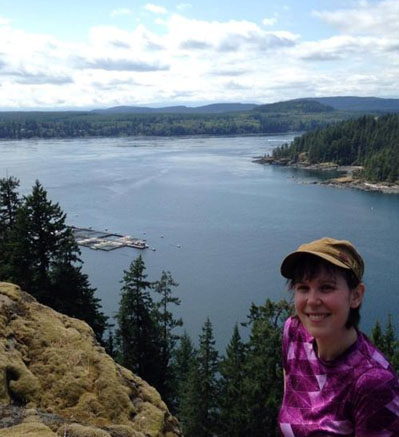|
|

|
  
Features
Update 2019/12/27
Aquaculture
brought to you in part by

UNIVERSITY OF WATERLOO STUDENT'S RESEARCH ON IMPROVING AQUACULTURE
By Suzanne Forcese
Because of the rising demand for fish protein in the Canadian diet and around the world, an irreversible decline in wild fish populations exists. Aquaculture has become a necessary means to protect a valuable resource while still providing a high quality product for market.
According to Fisheries and Oceans Canada, “In Canada aquaculture was first used to enhance natural stocks. It is now a large-scale commercial industry...Over the last decade the economic contribution of aquaculture to the economy has more than doubled reaching $487.4 million in 2018.”
However, it is imperative that these culture systems have a minimum impact on the environment.
WaterToday caught up with a University of Waterloo researcher, just as she had successfully defended her doctorate. Shawna Semple, PhD, who grew up in the small fishing town of Port Dover told WT, “I came to Waterloo to be an optometrist, but as I got into it I realized it wasn’t what I wanted. I knew nothing about research. I think it’s not on the radar for most students.”
After taking a course on micro-organisms and disease, Semple realized she had a desire “to learn more about immunology which led me to Dr. Brian Dixon but I still stayed back from research.” It would appear there was a different plan for Semple though, as Dr. Dixon, a world expert on the environmental effects on fish immune systems, approached her to “roll with some research on Chinook Salmon in British Columbia.”
Up until 1922, as many as 11 million Chinook Salmon were harvested annually before a decline in wild populations was noted. Unfortunately native populations are in decline at such a rate that annual harvests are now approximately 2 million per year. This has resulted in Chinook Salmon’s addition to the threatened species list, despite concerted efforts to replenish wild populations via hatchery bred stocks.
Semple’s field work began with a small family owned fish farm, Yellow Island Aquaculture Limited (YIAL) on Quadra Island. YIAL is dedicated to taking the whole picture long-term view to growing salmon and protecting the environment and is in collaborations with academia, industry and government.
The research Semple was involved with was a deeper understanding of the Chinook Salmon’s immune system. “It is necessary for successful aquaculture practices. A large obstacle to overcome when dealing with aquaculture production of any type is the vulnerability to disease outbreaks.” Like any other agricultural practice, aquaculture places fish in settings outside their natural environment. The stress induced by overcrowding, temperature fluctuations and handling can result in normally benign microorganisms becoming opportunistic organisms.

Shawna Semple with YIAL fish farm shown below
Global losses due to aquatic infections total approximately $6 billion USD and currently fish farmers have few methods outside of antibiotics to prevent/control outbreaks. With multi-drug resistance continually on the rise, “we are working with alternative approaches at YIAL,” Semple said. “Some farms are claiming to be organic, but right now to be considered ‘organic’ the fish only need be certified to have been antibiotic- free 6 months before being sold. We are working on having fish antibiotic free from egg to harvest.”
Semple’s research group worked with naturally occurring antimicrobial peptides (AMPs) which are a diverse class of highly conserved molecules that are produced as a first line of defence in multicellular organisms. AMPs are essential components of innate immunity capable of antimicrobial activity against a wide range of microbial pathogens. “AMPs are promising alternatives to antibiotics in aquaculture facilities.”
“My work also involves looking at the immune system of fish species when exposed to foreign objects, specifically telemetry tags used to track and understand fish populations.”
Intracoelomic implantation of acoustic tags is the main tagging method used for both freshwater and saltwater fish. However, despite the valuable information obtained from acoustic telemetry there is much concern about the impact of these implants of fish welfare.
“The results of my research could help to improve tags for tracking fish populations (since they appear to stimulate a chronic immune response) or help to improve vaccine/treatment options for aquaculture.”
It’s a long process, Semple says while spending a week on site at YIAL fertilizing eggs, sorting and then hatching some. “I am looking at the effects of probiotics (with other students). The research is showing some promise.”
Knowing the important role of research in directing positive change, Semple devotes her outreach activities to student mentoring. As Editor/Reviewer for the Journal of Student Science and Technology (fsst.ca), Semple understands the value of students learning the skills involved with research. “The Journal of Student Science and Technology gives these students an opportunity to write scientific articles and have them critiqued by other researchers (much like the way research is published in academia). I think this is a valuable skill because being able to actually share your results with the scientific community and general population is critical.”
Semple also is a volunteer organizer of the Sanofi Biogenius Challenge that occurs at the University of Waterloo every year; the student committee president for the International Society of Fish and Shellfish Immunology; and the graduate student representative for the University of Waterloo Animal Care Committee.
Shawna Semple’s future work will take her to Wilfrid Laurier University where she has accepted a postdoctoral position looking at RNA interference with human cells. Her advice to students – “Don’t be afraid of research. Research is valuable.”
suzanne.f@watertoday.ca
|
|
|
Have a question? Give us a call 613-501-0175
All rights reserved 2025 - WATERTODAY - This material may not be reproduced in whole or in part and may not be distributed,
publicly performed, proxy cached or otherwise used, except with express permission.
|
| |